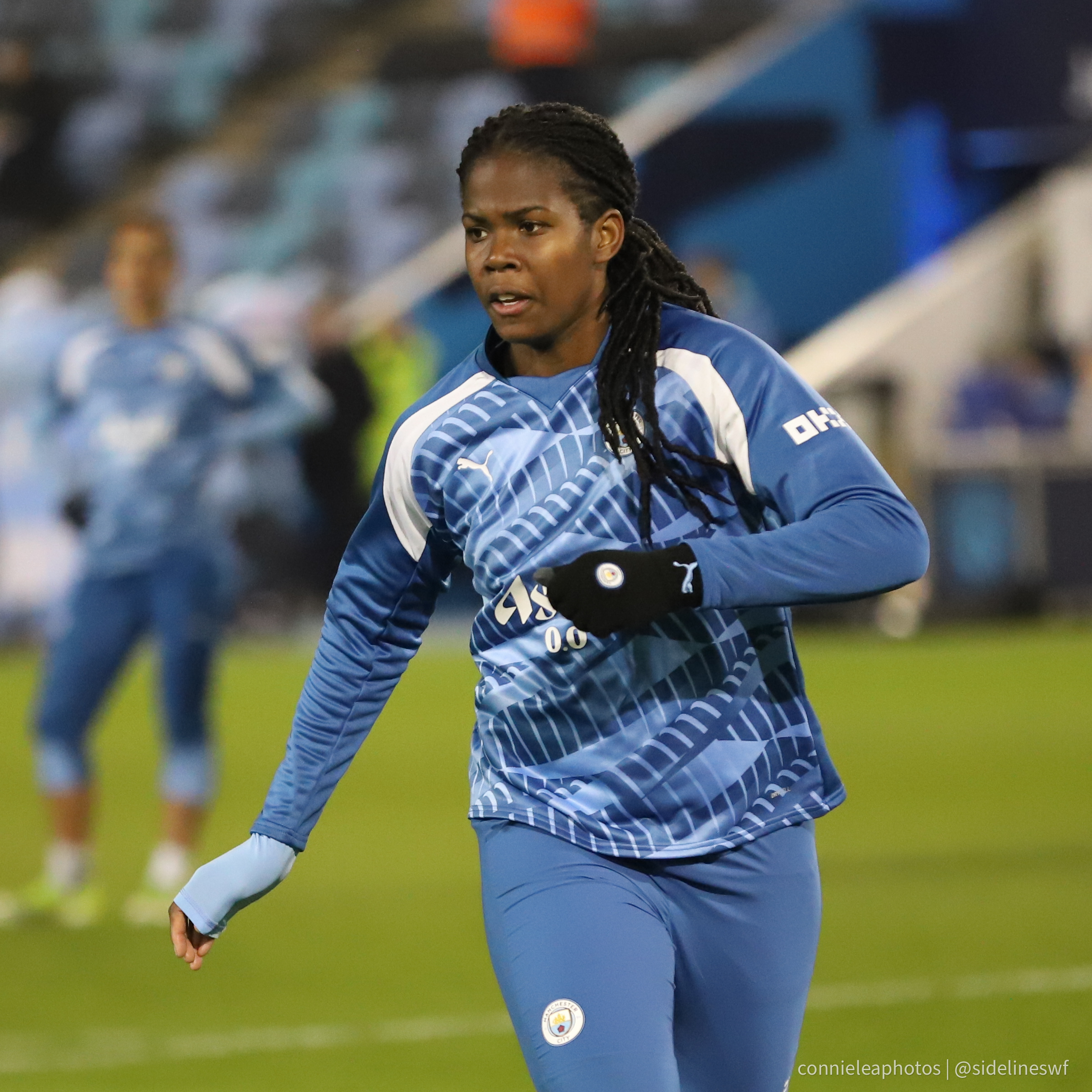After Manchester City’s 4-2 loss to Arsenal in the Women’s Super League on Sunday, February 2, Khadija ‘Bunny’ Shaw was subjected to racial and misogynistic abuse on social media.
City faced Arsenal again four days later in the League Cup final, this time securing a win. However, Shaw was not included in the matchday squad, choosing not to travel to the game in order to protect her mental health following the abuse.
“When you are affected by things like that it’s really, really difficult,” City head coach Gareth Taylor told Sky Sports after their League Cup win.
“I’ve not really had time to have a good conversation with her about it, but she knows and she needs to know that the whole team and the whole club are behind her on this.”
The club released a statement, confirming the messages had been forwarded to authorities and condemning the abuse Shaw endured as ‘disgusting.’
“Discrimination of any kind, either in stadiums or online, will not be tolerated and has absolutely no place inside or outside the game. Bunny has decided not to share the messages publicly so as not to give the oxygen of publicity to the vile individuals who sent them.”
The Jamaica international returned to action on Sunday, February 9, scoring in City’s 3-1 win over Leicester City in a fifth-round FA Cup clash.
The mental health toll on players
Shaw’s decision to withdraw from the League Cup final is a clear example of the damaging impact racism has on athletes.
The women’s game already faces enough adversity in a world that still struggles to fully accommodate women in sports. Adding racial discrimination to the mix only makes an already difficult environment even harder to navigate.
The City forward is far from the only player to experience this. Women of colour in football constantly face these challenges.
In 2023, Chelsea’s Lauren James received racial abuse, and just like Shaw, ultimately took a temporary step back from football to prioritise her mental health.
And while diversity is more apparent in women’s football than in the men’s game, racism is still just as prevalent. Black male footballers continue to endure it – Marcus Rashford, Jadon Sancho, and Bukayo Saka were all targeted with racial abuse after England’s Euro 2020 final.
It’s not just football either. Naomi Osaka in tennis and Lewis Hamilton in Formula 1 have also had to battle the weight of racial discrimination throughout their careers.
Athletes are real people. When sports should be about talent, passion, and skill, it’s exhausting to see players torn down over something as irrelevant as skin colour.
It affects their mental health. It affects their performance.
Manchester City taking a stand and calling out racism for what it is is a step in the right direction. However, statements alone aren’t enough—other players, especially, need to speak out and unequivocally condemn it.
The problem of reactionary vs. preventative action
In the aftermath of Bunny Shaw’s recent experience with online abuse, Manchester City swiftly condemned the actions and reported the incident to the authorities.
While these actions are necessary, they often feel like déjà vu—a relentless cycle of abuse, public outrage, and then…silence. The abuse continues, and the perpetrators face little to no consequences.
It’s time to shift from reactionary responses to proactive measures. Clubs and governing bodies must implement strategies that don’t just address abuse after it occurs but actively work to prevent it.
Solidarity from non-POC players in women’s football is also crucial in combating racism. Their support amplifies the voices of marginalised players and fosters a more inclusive environment.
However, this solidarity must be genuine and proactive, not just performative.
The burden on victims to ‘handle It gracefully’
Shaw’s decision to avoid publicising the racist messages she received is understandable.
But why should athletes be expected to take the “high road” when facing such abuse? This expectation unfairly shifts the burden onto the victims, often minimising their experiences while allowing perpetrators to go unchallenged.
Society often expects Black athletes, especially Black women, to demonstrate resilience and grace in the face of adversity, rather than expressing rightful outrage. This expectation stems from a long history of marginalisation and a desire to maintain the status quo.
When athletes speak out against racism, they are sometimes labelled as divisive or confrontational, further perpetuating the cycle of silence and inaction.
This double standard is evident when comparing the responses to different forms of discrimination.
For instance, antisemitism often receives swift and blunt condemnation. In contrast, racism, particularly when directed at Black athletes, is sometimes downplayed or dismissed, with victims expected to ‘handle it gracefully‘ and without adequate support.
This disparity highlights the need for a more consistent and robust approach to all forms of discrimination in sports.
Athletes should not be burdened with the responsibility of managing their reactions to wrongful discrimination.
Instead, there should be a collective effort to create an environment where all forms of discrimination are addressed promptly and effectively, ensuring that victims receive the support and justice they deserve.



